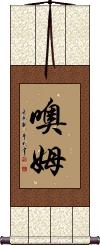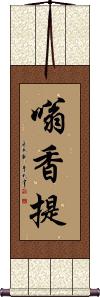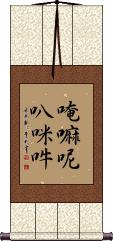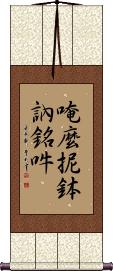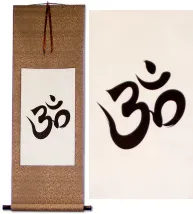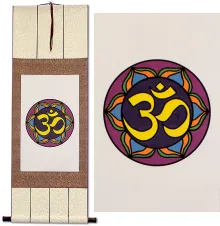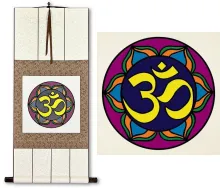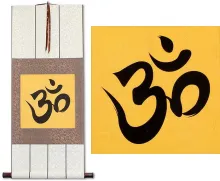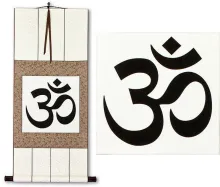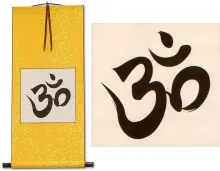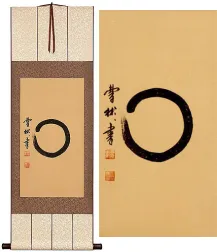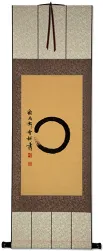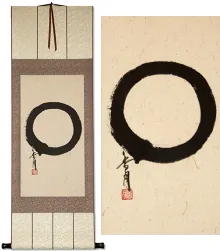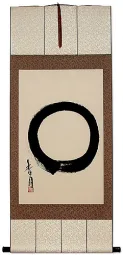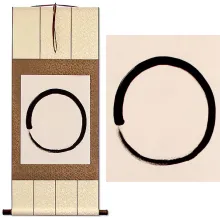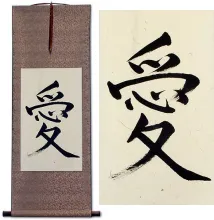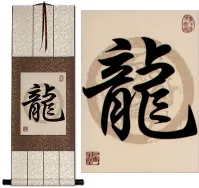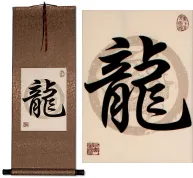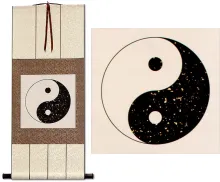Many custom options...
And formats...

Om Symbol in Chinese / Japanese...
Buy an Om Symbol calligraphy wall scroll here!
Personalize your custom “Om Symbol” project by clicking the button next to your favorite “Om Symbol” title below...
Om
Meditation Chant
Om Shanti
Om Mani Padme Hum
Om Mani Padme Hum
Oṃ maṇi padme hūṃ
唵麼抳鉢訥銘吽 is one of the earliest and best-known mantras in the Buddhist tradition.
It can be heard in temples from Tokyo to Tibet.
This mantra is an expression of the basic attitude of compassion. It translates literally as “oṃ the jewel in the lotus hūṃ.”
There are several titles and transliterations for this mantra, including, 六字大明呪 (Great 6-syllable mantra), 六字真言 (6-syllable Sanskrit mantra of Avalokiteshvara bodhisattva), 唵嘛呢叭咪吽, 唵嘛呢叭咪哞, and 唵嘛咪叭呢哞.
Contact me if you need any of these alternates on your wall scroll.
This in-stock artwork might be what you are looking for, and ships right away...
Gallery Price: $72.00
Your Price: $39.88
Not the results for om symbol that you were looking for?
Below are some entries from our dictionary that may match your om symbol search...
| Characters If shown, 2nd row is Simp. Chinese |
Pronunciation Romanization |
Simple Dictionary Definition |
〇 see styles |
líng ling2 ling maru まる |
More info & calligraphy: Enso - Japanese Zen Circle(1) circle (sometimes used for zero); (2) 'correct' (when marking); (3) symbol used as a placeholder (either because a number of other words could be used in that position, or because of censorship); (4) period; full stop; (5) maru mark; semivoiced sound; p-sound |
囍 see styles |
xǐ xi3 hsi |
More info & calligraphy: Double Happiness |
星 see styles |
xīng xing1 hsing hoshi(p); hoshi(sk) ほし(P); ホシ(sk) |
More info & calligraphy: Star(1) star (usu. excluding the Sun); planet (usu. excluding Earth); heavenly body; (2) star (glyph, symbol, shape); asterisk; (3) star (actor, player, etc.); (4) dot; spot; fleck; (5) bullseye; (6) (slang) (police slang; oft. written as ホシ) perp; perpetrator; culprit; offender; suspect; (7) (See 九星) one's star (that determines one's fate); one's fortune; (8) {sumo} point; score; (9) {go} star point (intersection marked with a dot); hoshi; (10) (pyrotechnic) star; (surname) Hotsu Tara, a star; the 25th constellation consisting of stars in Hydra; a spark. |
露 see styles |
lù lu4 lu tsuyu つゆ |
More info & calligraphy: Dew(1) dew; (2) tears; (adverb) (3) (See 露聊かも) (not) a bit; (not) at all; (place-name) Russia Dew; symbol of transience; to expose, disclose. |
鹿 see styles |
lù lu4 lu shika(p); kasegi(ok); ka(ok); roku(ok); shika しか(P); かせぎ(ok); か(ok); ろく(ok); シカ |
More info & calligraphy: Deerdeer (esp. the sika deer, Cervus nippon); cervid; (personal name) Roku mṛga; a deer; as Śākyamuni first preached the four noble truths in the Deer-garden, the deer is a symbol of his preaching. |
愛心 爱心 see styles |
ài xīn ai4 xin1 ai hsin aishin あいしん |
More info & calligraphy: Loving Heart / Compassion(obsolete) love; affection; (female given name) Rabu A loving heart; a mind full of desire; a mind dominated by desire. |
貝克 贝克 see styles |
bèi kè bei4 ke4 pei k`o pei ko |
More info & calligraphy: Beck |
金剛 金刚 see styles |
jīn gāng jin1 gang1 chin kang kongou / kongo こんごう |
More info & calligraphy: Diamond(1) vajra (indestructible substance); diamond; adamantine; (2) thunderbolt; Indra's weapon; Buddhist symbol of the indestructible truth; (p,s,g) Kongou vajra, 伐闍羅; 跋折羅 (or跋闍羅); 縛曰羅(or 縛日羅) The thunderbolt of Indra, often called the diamond club; but recent research considers it a sun symbol. The diamond, synonym of hardness, indestructibility, power, the least frangible of minerals. It is one of the saptaratna 七寶. |
スター see styles |
sutaa / suta スター |
More info & calligraphy: Starr |
ブラス see styles |
purasu プラス |
More info & calligraphy: Bras |
マーク see styles |
maaku / maku マーク |
More info & calligraphy: Mark |
因陀羅 因陀罗 see styles |
yīn tuó luó yin1 tuo2 luo2 yin t`o lo yin to lo Indara |
More info & calligraphy: IndraIndra, 因坻; 因提; 因提梨; 因達羅; 天帝; 天主帝; 帝釋天; originally a god of the atmosphere, i. e. of thunder and rain; idem Śakra; his symbol is the vajra, or thunderbolt, hence he is the 金剛手; he became 'lord of the gods of the sky', 'regent of the east quarter', 'popularly chief after Brahmā, Viṣṇu, and Śiva, '(M.W.); in Buddhism he represents the secular power, and is inferior to a Buddhist saint. Cf. 忉利 and 印. |
妙蓮華 妙莲华 see styles |
miào lián huá miao4 lian2 hua2 miao lien hua myō renge |
More info & calligraphy: Wisdom Lotus |
不動明王 不动明王 see styles |
bù dòng míng wáng bu4 dong4 ming2 wang2 pu tung ming wang fudoumyouou / fudomyoo ふどうみょうおう |
More info & calligraphy: Fudo Myo-o / Wisdom King不動尊 Aryacalanatha 阿奢羅曩 tr. 不動尊 and 無動尊 and Acalaceta, 阿奢囉逝吒 tr. 不動使者. The mouthpiece or messenger, e. g. the Mercury, of the Buddhas; and the chief of the five Ming Wang. He is regarded as the third person in the Vairocana trinity. He has a fierce mien overawing all evil spirits. He is said to have attained to Buddhahood, but also still to retain his position with Vairocana. He has many descriptive titles, e. g. 無量力神通無動者; 不動忿怒王, etc. Five different verbal signs are given to him. He carries a sharp wisdom-sword, a noose, a thunder-bolt. The colour of his images is various—black, blue, purple. He has a youthful appearance; his hair falls over his left shoulder; he stands or sits on a rock; left eye closed; mouth shut, teeth gripping upper lip, wrinkled forehead, seven locks of hair, full-bodied, A second representation is with four faces and four arms, angry mien, protruding teeth, with fames around him. A third with necklaces. A fourth, red, seated on a rock, fames, trident, etc. There are other forms. He has fourteen distinguishing symbols, and many dharanis associated with the realm of fire, of saving those in distress, and of wisdom. He has two messengers 二童子 Kimkara 矜羯羅 and Cetaka 制吒迦, and, including these, a group of eight messengers 八大童子 each with image, symbol, word-sign, etc. Cf. 不動佛. |
〜 see styles |
〜 〜 |
(unc) (See チルダ,にょろ) tilde symbol |
卍 see styles |
wàn wan4 wan manji まんじ |
swastika, a sacred and auspicious symbol in Hinduism, Buddhism, and Jainism swastika (esp. a counterclockwise swastika as a Buddhist symbol); fylfot; gammadion; (given name) Manji sauvastika, 塞縛悉底迦; also styled 室利靺瑳 śrīvatsa, lucky sign, Viṣṇu's breast-curl or mark, tr. by 海雲 sea-cloud, or cirrhus. Used as a fancy form of 萬 or 萬; and is also written in a form said to resemble a curl. It is the 4th of the auspicious signs in the footprint of Buddha, and is a mystic diagram of great antiquity. To be distinguished from 卐svastika, the crampons of which turn to the right. |
卐 see styles |
wàn wan4 wan man |
swastika, a sacred and auspicious symbol in Hinduism, Buddhism, and Jainism, later adopted by Nazi Germany (Skt. svastika) |
印 see styles |
yìn yin4 yin in いん |
to print; to mark; to engrave; a seal; a print; a stamp; a mark; a trace; image (1) stamp; seal; chop; (2) seal impression; seal; sealing; stamp; mark; print; (3) {Buddh} mudra (symbolic hand gesture); (4) ninja hand sign; (5) (abbreviation) (See 印度・インド) India; (surname) In mudrā; seal, sign, symbol, emblem, proof, assurance, approve; also 印契; 契印; 印相. Manual signs indicative of various ideas, e. g. each finger represents one of the five primary elements, earth, water, fire, air, and space, beginning with the little finger; the left hand represents 定 stillness, or meditation, the right hand 慧 discernment or wisdom; they have also many other indications. Also, the various symbols of the Buddhas and Bodhisattvas, e. g. the thunderbolt; cf. 因.; (度) The five Indias, or five regions of India, idem 五天竺 q. v. |
字 see styles |
zì zi4 tzu ji じ |
letter; symbol; character; word; CL:個|个[ge4]; courtesy or style name traditionally given to males aged 20 in dynastic China (1) character (esp. kanji); letter; written text; (2) handwriting; penmanship; (3) (as 〜の字) (See ほの字) the ... word (e.g. "the L word" = "love"); (place-name) Aza akṣara, 阿乞史囉; 阿刹羅; a letter, character; akṣara is also used for a vowel, especially the vowed 'a' as distinguished from the other vowels; a word, words. |
梓 see styles |
zǐ zi3 tzu azusa; shi; azusa あずさ; し; アズサ |
Chinese catalpa (Catalpa ovata), a tree that serves as a symbol of one's hometown and whose wood is used to make various items; (bound form) printing blocks (1) (あずさ, アズサ only) (kana only) (See 夜糞峰榛) Japanese cherry birch (Betula grossa); (2) (あずさ, アズサ only) (See キササゲ) yellow catalpa (Catalpa ovata); (3) (あずさ, アズサ only) (See 赤芽柏・1) Japanese mallotus (Mallotus japonicus); (4) printing block; (5) (あずさ only) (abbreviation) (See 梓弓) catalpa bow; (6) (あずさ only) (abbreviation) (See 梓巫女) catalpa medium; (surname) Shin |
標 标 see styles |
biāo biao1 piao hyou / hyo ひょう |
mark; sign; label; to mark with a symbol, label, lettering etc; to bear (a brand name, registration number etc); prize; award; bid; target; quota; (old) the topmost branches of a tree; visible symptom; classifier for military units (1) (rare) mark; sign; target; (2) (archaism) plain wood showing the seating order of officials at court; (3) (archaism) nameplate; (female given name) Maaku Signal, flag, banner; the troops under a particular banner; a notice, list, signboard, ticket; to publish. |
符 see styles |
fú fu2 fu fu ふ |
mark; sign; talisman; to seal; to correspond to; tally; symbol; written charm; to coincide (1) charm; talisman; amulet; (2) tally; (3) sign; mark; note; (counter) (4) {mahj} fu; unit used in calculation of a hand's score; (surname) Fu |
黼 see styles |
fǔ fu3 fu |
(archaic) motif of axes with black handles and white heads, a symbol of authority embroidered on ceremonial robes |
〇〇 see styles |
marumaru まるまる |
(1) symbol used as a placeholder (either because a number of other words could be used in that position, or because of censorship); (prefix noun) (2) certain; unnamed; undisclosed; unidentified |
一印 see styles |
yī yìn yi1 yin4 i yin ichi'in |
A seal, sign, symbol. |
万字 see styles |
manji まんじ |
swastika (esp. a counterclockwise swastika as a Buddhist symbol); fylfot; gammadion; (place-name, surname) Manji |
中点 see styles |
nakaten なかてん chuuten / chuten ちゅうてん |
middle dot (typographical symbol used between parallel terms, names in katakana, etc.); full-stop mark at mid-character height; interpoint (interword separation); (1) middle point; median point; (2) middle dot (typographical symbol used between parallel terms, names in katakana, etc.); full-stop mark at mid-character height; interpoint (interword separation) |
中黒 see styles |
nakaguro なかぐろ |
(・) middle dot; centred period; full-stop mark at mid-character height; interpoint; symbol used for interword separation, between parallel terms, names in katakana, etc.; (place-name, surname) Nakaguro |
丸C see styles |
marushii / marushi まるシー |
(1) copyright symbol; copyright sign; (2) copyright |
九鼎 see styles |
jiǔ dǐng jiu3 ding3 chiu ting |
the Nine Tripod Cauldrons, symbol of state power, dating back to the Xia Dynasty |
Click here for more om symbol results from our dictionary
The following table may be helpful for those studying Chinese or Japanese...
| Title | Characters | Romaji (Romanized Japanese) | Various forms of Romanized Chinese | |
| Om | 噢姆 | mū / o1 mu1 / o mu / omu | ||
| Om Shanti | 嗡香提 | wēng xiāng tí weng1 xiang1 ti2 weng xiang ti wengxiangti | weng hsiang t`i wenghsiangti weng hsiang ti |
|
| Om Mani Padme Hum | 唵嘛呢叭咪吽 | ǎn ma ní bā mī hōng an3 ma5 ni2 ba1 mi1 hong1 an ma ni ba mi hong anmanibamihong | an ma ni pa mi hung anmanipamihung |
|
| Om Mani Padme Hum | 唵麼抳鉢訥銘吽 唵么抳钵讷铭吽 | on mani padomei un onmanipadomeiun | ǎn mó nǐ bō míng hǒu an3 mo2 ni3 bo1 ne4 ming2 hou3 an mo ni bo ne ming hou anmoniboneminghou | an mo ni po ne ming hou anmoniponeminghou |
| In some entries above you will see that characters have different versions above and below a line. In these cases, the characters above the line are Traditional Chinese, while the ones below are Simplified Chinese. | ||||
Successful Chinese Character and Japanese Kanji calligraphy searches within the last few hours...
